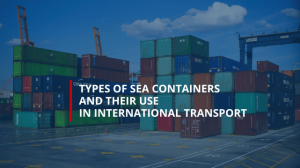

07/03/2024
Everything you need to know about freight forwarding
Everything you need to know about freight forwarding
Freight forwarding is a crucial element in today’s global trade, yet its role and significance often remain misunderstood by many. In this article, we will delve into the definition of freight forwarding, discuss its scope of operation, and present key information regarding this area of business activity.
What is freight forwarding?
Freight forwarding is a comprehensive process of managing the transportation of goods, starting from their acceptance from the client, through organizing transportation, until delivery to the destination. It also includes services related to crossing borders and customs clearance. Freight forwarders play a crucial role as intermediaries between clients and carriers, ensuring the smooth execution of transportation orders.
Scope of freight forwarding companies’ activities
Freight forwarding encompasses a wide range of activities, including planning and organizing transportation, negotiating with carriers, managing documentation, and solving logistical problems. Additionally, freight forwarding companies provide customs services and can handle the import and export of goods.
Who is a freight forwarder and what are their competencies?
A freight forwarder is a professional who specializes in organizing the transportation of goods. They have extensive knowledge of customs law and transportation regulations, negotiation skills, and excellent familiarity with the logistics market. Moreover, their main goal is to ensure efficient and safe transportation of goods.
Stages of the freight forwarding process
a) Acceptance of the order: the freight forwarder receives the order from the client and analyzes its requirements and specifications.
b) Transport planning: the freight forwarder selects the appropriate means of transport and route, taking into account the client’s priorities and logistical constraints.
c) Negotiations with carriers: the freight forwarder negotiates transportation terms with various carriers, selecting the best offer in terms of price, timeliness, and safety.
d) Transport organization: the freight forwarder prepares the necessary documentation and coordinates all stages of transportation, ensuring timely delivery of goods.
e) Transport monitoring: the freight forwarder tracks the transportation and responds to any problems, ensuring continuity of deliveries.
Legal foundations of freight forwarding
Freight forwarding is governed by a set of legal regulations, both domestic and international. Key legal acts concerning freight forwarding include customs law provisions, the civil code, and various international agreements regulating the transportation of goods.
Key freight forwarding documents
In the world of freight forwarding, documentation plays a crucial role in confirming the conditions and details of goods transportation. Below are the most important documents necessary for the effective and safe flow of goods through the logistical process:
- a) Freight forwarding order: treated as a form of agreement, it is a binding document if a carriage contract has not been concluded. It specifies the actions that the freight forwarder should take, such as customs clearance, quantity and quality control of goods, insurance, and storage. There are two types of orders: one-time, concerning the organization of transport for a single shipment, and framework, specifying recurring activities for the handling of an entire batch of goods.
- b) Carriage contract: a document containing the terms and obligations of the carrier and the principal regarding the provision of transport services. There is no uniform carriage contract form, but its content should include key information that will help resolve any disputes.
- c) Freight forwarding certificate: issued by the freight forwarder, it confirms the acceptance of the goods and obliges them to send or release them to the consignee. It is a universal document that transfers material responsibility for the cargo to the freight forwarder.
- d) Shipping instructions: a document prepared by the freight forwarder based on the client’s order. It contains detailed information on preparing the goods for loading/shipping and instructions for the loader. Based on the instructions, a waybill is prepared.
- e) Routing order: transmitted electronically, it contains detailed information about the goods, shipping method, and documents necessary for transportation to another country.
- f) Product specifications: documents prepared by the manufacturer of the goods, containing a detailed description of the goods. They are divided into detailed specifications (on each package) and collective specifications (a compilation of detailed specifications).
Conclusion
In our article, we have extensively discussed key issues related to freight forwarding, from the definition of the concept to its importance in global trade. Freight forwarding is an integral part of the logistics process, and professional freight forwarders play a crucial role in ensuring the smooth flow of goods through the supply chain. With comprehensive knowledge, negotiation skills, and familiarity with customs and transportation regulations, freight forwarders can effectively manage transportation, minimize risk, and ensure the safety of shipments. Properly completed freight forwarding documents also play a vital role in confirming transportation conditions and details, guaranteeing a smooth logistical process. Therefore, by utilizing the services of freight forwarding companies, one can be confident in the efficient and safe transportation of goods to their destination.


